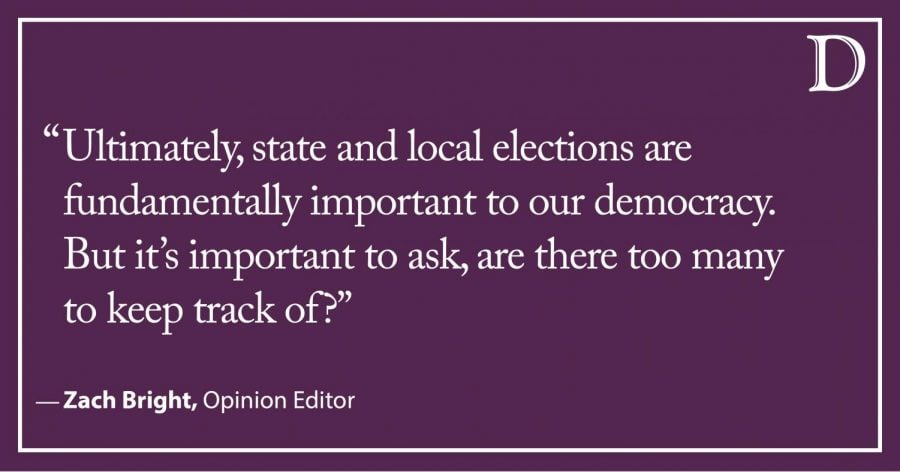Bright: When it comes to state and local elections, less can be more
February 18, 2020
This is the fifth and final column in “Democracy Do-Over,” a weekly series exploring and making the case for improvements in how we elect public servants and ensure effective representation by all levels of government.
When I voted in my first general election last in 2018, I cast my ballot for the governor of Florida. Then, my U.S. House representative. Then, a number of state offices and judges. Next came my state senator, state house representative and school board. After that were numerous state ballot initiatives and county charter questions that I was either vaguely familiar with or had to do some research on before making my choices.
Then my hospital board? I didn’t even know we had a hospital board, or frankly what their responsibilities entail.
It can be easy to get swept up in the idea that democracy is great. Evidently, it is the preferred form of government, with a majority of nations’ governments operating as one. However, when it comes to the minutiae of local government, there can be a thing as too much. There are a plethora of decisions voters have to make at the polls. If offices are too obscure for voters to know enough about, then votes can be cast on an uneducated basis. As a result, elections to low level offices can result in unqualified candidates winning.
It might appear that something like a hospital board lacks power. Similar positions on soil and water management boards, liquor control boards and railroad commissions populate ballots in places across the country. The duties overseen by these offices are crucial to the communities they are elected to serve.
For instance, a soil and water management board is often the sole local unit of government in a community in charge of conserving natural resources. This can have tremendous effects on local communities in regard to environmental protection or degradation, often more so than a federal statute might.
It would seem, therefore, that voters should be empowered to choose who will represent them in seats that would impact them the most. For some communities, they might value this opportunity to determine these decisions. People know even less about their local and state governments. They can get consumed with national politics, and even then many aren’t well-informed about their state and local representatives. When it comes to this smaller level, they more often than not know less about what might be happening in their own backyard.
Because these positions have such consequential impacts, the problem with letting the public determine the officeholder is that they simply aren’t sure what each position has authority over. That being so, such positions might be better managed if determined on a meritocratic basis rather than through a popular vote. A winning candidate might be able to come away victorious in an election, but they might be a poor choice at actually implementing effective measures to ensure that water management is thoroughly managed and maintained, for example.
The takeaway by no means should not be to eliminate state and local offices across the board. Rather, there should be more active efforts to inform and educate younger generations about these positions if they are important and should be voted on by the electorate. At the same time, there are plenty of obscure offices whose officeholders do not need to be settled at a hyperlocal level, and doing away with those elections might be a good thing.
Ultimately, state and local elections are fundamentally important to our democracy. But it’s important to ask, are there too many to keep track of?
Zach Bright is a Medill sophomore. He can be contacted at [email protected]. If you would like to respond publicly to this op-ed, send a Letter to the Editor to [email protected]. The views expressed in this piece do not necessarily reflect the views of all staff members of The Daily Northwestern.


